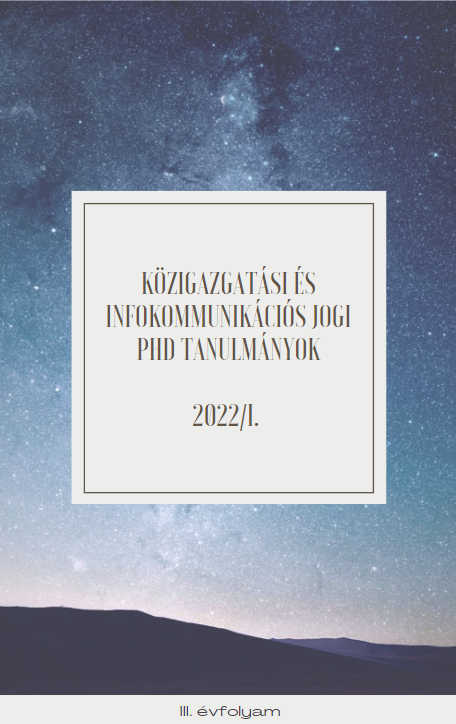A mesterséges intelligencia alkalmazásának adatvédelmi aggályai a közigazgatásban
DOI:
https://doi.org/10.47272/KIKPhD.2022.1.1Kulcsszavak:
közigazgatás, mesterséges intelligencia, adatvédelemAbsztrakt
A Mesterséges Intelligenciák (MI) – tágabban megfogalmazva az algoritmusvezérelt folyamatok – alkalmazási kérdéseinek aktualitását az információ- és kommunikációtechnológia gyors fejlődése indukálja. Minden előnyével és hátrányával együtt ez kétségtelenül meghatározó tényező mind a köz-, mind a magánszféra szereplői számára, ezért is válhatott a digitalizáció egyik központi célkitűzésévé az európai és hazai közigazgatásnak. A fejlődési cél szem előtt tartása mellett azonban nem szabad megfeledkezni a kockázatokról, amelyek különösen nagy hatást gyakorolhatnak az emberi méltóságra és annak védelmére, a természetes személyek magánszférájába való aránytalan beavatkozás, valamint a személyes adataiknak nem megfelelő kezelése által. Jelen kutatás célja a közigazgatási rendszerek általi MI használat központi adatvédelmi aggályainak azonosítása. Ehhez a szükséges mértékben a közigazgatásban alkalmazható algoritmusok jelenlegi és lehetséges felhasználási területeinek feltárására és az Általános Adatvédelmi Rendelet mesterséges intelligenciával kapcsolatos szabályozási megközelítésének vizsgálatára is sor kerül.
Letöltések
Hivatkozások
Misuraca, Gianluca – van Noordt, Colin: Overview of the use and impact of AI in public services in the EU, (Publications Office of the European Union, Luxembourg, 2020)
Southerton, Clare: Datafication. Schintler, Laurie – McNeely, Connie (Szerk.): Encyclopedia of Big Data. (Springer, 2020)
Bankó Zoltán – Szőke Gergely László: Az információtechnológia hatása a munkavégzésre, (Utilitates Bt., Pécs, 2015)
Magyary Zoltán: Magyar Közigazgatás. (Királyi Magyar Egyetemi Nyomda, Budapest, 1942)
Magyarország helyi önkormányzatairól szóló 2011. évi CLXXXIX. törvény Preambuluma
Patyi András: A közigazgatási működés jogi alapjai (Dialóg Campus Kiadó, Budapest, 2017)
Samu Nagy Dániel „Mesterséges Intelligencia a Közigazgatásban” Országgyűlés Hivatal, Képviselői Információs Szolgálat 2021/73.
Iváncsics Imre – Fábián Adrián: Hatósági Jogalkalmazás a Közigazgatásban (Dialóg Campus Kiadó, Budapest-Pécs, 2013)
Fejes Erzsébet – Futó Iván, „Mesterséges intelligencia a közigazgatásban – az érdemi ügyintézés támogatása” Pénzügyi Szemle Különszám 2021/1,
Jóri András: Adatvédelmi Kézikönyv, Elmélet, Történet, Kommentár. Budapest, Osiris Kiadó, 2005.
European Parliamentary Research Service, Scientific Foresight Unit (STOA): The impact of the General Data Protection Regulation (GDPR) on artificial intelligence (PE 641.530 – June 2020)
Fejes Erzsébet – Futó Iván, „Mesterséges intelligencia a közigazgatásban – az érdemi ügyintézés támogatása” Pénzügyi Szemle Különszám 2021/1,
Siapka, Anastasia, „The Ethical and Legal Challenges of Artificial Intelligence: The EU response to biased and discriminatory AI” Panteion Társadalom- és Államtudományi Egyetem (2018)
European Parliamentary Research Service, Scientific Foresight Unit (STOA): The impact of the General Data Protection Regulation (GDPR) on artificial intelligence (PE 641.530 – June 2020)
Szőke Gergely László, „Az adatvédelem szabályozásának történeti áttekintése” Infokommunikáció és jog 2013/3
Szabó Máté Dániel: Az információs hatalom alkotmányos korlátai (Miskolci Egyetem, Miskolc, 2012)
Osztopáni Krisztián: Péterfalvi Attila – Révész Balázs – Buzás Péter (Szerk.): Magyarázat a GDPR-ról. (Wolters Kluwer Hungary, Budapest, 2018)
Az Európai Unió Alapjogi Ügynöksége és az Európa Tanács: Európai adatvédelmi jogi kézikönyv. (Az Európai Unió kiadóhivatala, Luxembourg, 2019)
Kis Kelemen Bence – Hohmann Balázs: A Schrems ítélet hatásai az európai uniós és magyar adattovábbítási gyakorlatokra. Infokommunikációs jog, 2016/2.,
Pataki Gábor – Szőke Gergely László „Az online személyiségprofilok jelentősége” Polyák Gábor (Szerk.): Algoritmusok, keresők, közösségi oldalak és a jog – a forgalomirányító szolgáltatások szabályozása (HVG-ORAC Lap- és Könyvkiadó Kft., Budapest, 2020)
Jóri András: A GDPR magyarázata (HVG-ORAC Lap- és Könyvkiadó Kft., Budapest, 2018)
Ződi Zsolt: Platformok, robotok és a jog (Gondolat Kiadó, Budapest, 2018)
Cohen, Julie E. „What privacy is for” 126 Harvard Law Review (2013)
Mayer-Schönberger, Viktor – Cukier, Kennethe: Big Data: A Revolution That Will Transform How We Live, Work, and Think (Boston, Houghton Mifflin Harcourt, 2013)
Agencia Española Protección Datos (AEPD): Technologies and Data Protection in Public Administrations (2020)
Mohay Ágoston, „A mesterséges intelligencia szabályozási perspektívái az Európai Unióban”, Kis Kelemen Bence – Mohay Ágoston (Szerk.): A technológiai fejlődés jogi kihívásai: Kézikönyv a jogalkotás és jogalkalmazás számára (Pécsi Tudományegyetem Állam- és Jogtudományi Kar, Pécs, 2021)
Edwards, Lilian „Enslaving the Algorithm: From a “Right to an Explanation” to a “Right to Better Decisions”?” IEEE Security & Privacy (2018) 16(3),
Chander, Anupam „The Racist Algorithm?” Michigan Law review, Volume 115, Issue 6. (2017) 1028-
Révész Balázs: Péterfalvi Attila – Révész Balázs – Buzás Péter (Szerk.): Magyarázat a GDPR-ról. (Wolters Kluwer Hungary, Budapest, 2018)
Hohmann Balázs, "A köztestületek átláthatóságának egyes feltételeiről" Közigazgatási és Infokommunikációs Jogi PhD Tanulmányok 1.1 (2020)
Wachter, Sandra - Mittelstadt, Brent – Russel, Chris, „Counterfactual explanations without opening the black box: automated decisions and the gdpr” Harvard Journal of Law & Technology Volume 31, Number 2 (2018)
Solove, Daniel J., „Privacy Self-Management and the Consent Dilemma”, 126 Harvard Law Review (2013)
Szőke Gergely László, „A közösségi oldalak szabályozási problémái”, Kis Kelemen Bence – Mohay Ágoston (Szerk.): A technológiai fejlődés jogi kihívásai: Kézikönyv a jogalkotás és jogalkalmazás számára (Pécsi Tudományegyetem Állam- és Jogtudományi Kar, Pécs, 2021)
Zarsky, Tal, ‘Transparent Predictions’, University of Illinois Law Review no. 4 (2013)
Desouza, Kevin C. – Dawson, Gregory S. – Chenok, Daniel „Designing, developing, and deploying artificial intelligence systems: Lessons from and for the public sector” Business Horizons Volume 63, Issue 2 (2020)
Downloads
Megjelent
Hogyan kell idézni
Folyóirat szám
Rovat
License
Copyright (c) 2022 Közigazgatási és Infokommunikációs Jogi PhD Tanulmányok

This work is licensed under a Creative Commons Attribution-NonCommercial-ShareAlike 4.0 International License.
A cikk felhasználási jogaira bármely harmadik fél számára az első közzétételt követően a Creative Commons Attribution-NonCommercial-ShareAlike 4.0 (CC-BY-NC-SA 4.0) licenc feltételek az irányadók.














